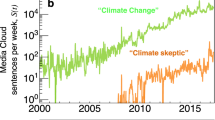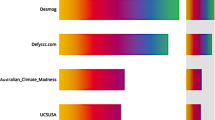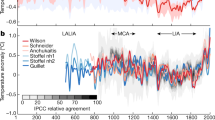Abstract
Through their editorializing practices, leading international science journals such as Nature and Science interpret the changing roles of science in society and exert considerable influence on scientific priorities and practices. Here we examine nearly 500 editorials published in these two journals between 1966 and 2016 that deal with climate change, thereby constructing a lens through which to view the changing engagement of science and scientists with the issue. A systematic longitudinal frame analysis reveals broad similarities between Nature and Science in the waxing and waning of editorializing attention given to the topic, but, although both journals have diversified how they frame the challenges of climate change, they have done so in different ways. We attribute these differences to three influences: the different political and epistemic cultures into which they publish; their different institutional histories; and their different editors and editorial authorship practices.
This is a preview of subscription content, access via your institution
Access options
Access Nature and 54 other Nature Portfolio journals
Get Nature+, our best-value online-access subscription
$29.99 / 30 days
cancel any time
Subscribe to this journal
Receive 12 print issues and online access
$209.00 per year
only $17.42 per issue
Buy this article
- Purchase on Springer Link
- Instant access to full article PDF
Prices may be subject to local taxes which are calculated during checkout



Similar content being viewed by others
References
Boykoff, M. T. Who Speaks for the Climate? Making Sense of Media Reporting on Climate Change (Cambridge Univ. Press, Cambridge, 2011).
Hoffman, A. J. Talking past each other? Cultural framing of skeptical and convinced logics in the climate change debate. Organ. Environ. 24, 3–33 (2011).
Henderson-Sellers, A. Climatic change: communication changes over this journal’s first ‘century’. Climatic Change 100, 215–227 (2010).
Starting a New Conversation on Climate Change with the European Centre-Right (Climate Outreach, 2015); https://climateoutreach.org/resources/starting-a-new-european-conversation-on-climate-change-with-the-centre-right
Aykut, S. C., Foyer, J. & Morena, E. (eds.) Globalizing the Climate: The Global Climate Debate after COP21 (Routledge, Abingdon, 2017).
Nerlich, B. & Koteyko, N. Compounds, creativity and complexity in climate change communication: the case of ‘carbon indulgences’. Glob. Environ. Change 19, 345–353 (2009).
O’Neill, S. J. & Smith, N. Climate change and visual imagery. WIREs Clim. Change 5, 73–87 (2014).
Capstick, S., Whitmarsh, L., Poortinga, W., Pidgeon, N. & Upham, P. International trends in public perceptions of climate change over the past quarter century. WIREs Clim. Change 6, 35–61 (2015).
Smith, P. & Howe, N. Climate Change as Social Drama: Global Warming in the Public Sphere (Cambridge Univ. Press, New York, NY, 2015).
Schneider, S. H. Science as a Contact Sport: Inside the Battle to Save Earth’s Climate (NationalGeographic Society, Washington, DC, 2009).
Hulme, M. Exploring Climate Change Through Science Essays, Interviews and Speeches (Routledge, Abingdon, 2013).
Solomon, G. E. A., Carley, S. & Porter, A. L. How multidisciplinary are the multidisciplinary journals Science and Nature? PloS ONE 11, e0152637 (2016).
Callaway, E. Centre of attention. Nature 499, 142–143 (2013).
Weiss, R. Nip misinformation in the bud. Science 358, 427 (2017).
Biagioli, M. The Oxford Companion to the History of Modern Science 624–625 (Oxford Univ. Press, Oxford, 2003).
Scott, A. Peer review and the relevance of science. Futures 39, 827–845 (2007).
Ciszar, A. The catalogue that made metrics and changed science. Nature 551, 163–165 (2017).
Kohler, R. E. Landscapes and Labscapes: Exploring the Lab–Field Border in Biology (Univ. Chicago Press, Chicago, IL, 2012).
Livingstone, D. N. Putting Science in its Place: Geographies of Scientific Knowledge (Univ. Chicago Press, Chicago, IL, 2010).
Schaffer, S. Ceremonies of measurement: rethinking the world history of science. Ann. Hist. Sci. Soc. 70, 335–360 (2015).
Baldwin, M. Making ‘Nature’: The History of a Scientific Journal (Univ. Chicago Press, Chicago, IL, 2015).
Jasanoff, S. (ed.) States of Knowledge: The Co-production of Science and the Social Order (Routledge, Abingdon, 2004).
Waaijer, C. J., van Bochove, C. A. & van Eck, N. J. On the map: Nature and Science editorials. Scientometrics 86, 99–112 (2011).
Pickering, A. The Mangle of Practice: Time, Agency, and Science (Univ. Chicago Press, Chicago, IL, 1995).
Callon, M. What Does it Mean to Say that Economics is Performative? Working Paper No. 5 (Centre de Sociologie de l’Innovation, 2016); https://halshs.archives-ouvertes.fr/halshs-00091596/document
Campbell, P. Statues: an editorial response. Nature 549, 334 (2017).
Waaijer, C. J., van Bochove, C. A. & van Eck, N. J. Journal editorials give indication of driving science issues. Nature 463, 157 (2010).
Hoey, J. & Todkill, A. M. An editorial on editorials. Can. Med. Assoc. J. 167, 1006–1007 (2002).
Smart, A., Tutton, R., Martin, P., Ellison, G. T. & Ashcroft, R. The standardization of race and ethnicity in biomedical science editorials and UK biobanks. Social. Stud. Sci. 38, 407–423 (2008).
Waaijer, C. J. Careers in science: policy issues according to Nature and Science editorials. Scientometrics 96, 485–495 (2013).
Campbell, P. John Maddox, 1925–2009: in memory of a transformative editor of. Nature 458, 807 (2009).
Singer, F. S. Will the world come to a horrible end? Science 170, 125 (1970).
The great greenhouse scare. Nature 229, 514 (1971).
Jaspal, R. & Nerlich, B. When climate science became climate politics: British media representations of climate change in 1988. Public Underst. Sci. 23, 122–141 (2014).
Hilgartner, S. & Bosk, C. L. The rise and fall of social problems: a public arenas model. Am. J. Sociol. 94, 53–78 (1988).
Lederman, L. M. & Malcolm, S. M. The next campaign. Science 323, 1265 (2009).
Schlesinger, W. H. Carbon trading. Science 314, 1217 (2006).
Stern, N. The Economics of Climate Change: The Stern Review (Cambridge Univ. Press, 2007).
Future-proofing. Nature 528, 164 (2015).
Better climate data required. Nature 410, 287 (2001)..
The heat is on. Nature 438, 296 (2005)..
McNutt, M. The beyond-two-degree inferno. Science 349, 7 (2015).
McNutt, M. Ignorance is not an option. Science 347, 1293 (2015).
Gupta, J. & Grubb, M. Climate Change and European Leadership (Elsevier, Amsterdam, 2000).
Shapin, S. Placing the view from nowhere: historical and sociological problems in the location of science. Trans. Inst. Br. Geogr. 23, 5–12 (1998).
Nerlich, B., Forsyth, R. & Clarke, D. Climate in the news: how differences in media discourse between the US and UK reflect national priorities. Environ. Commun. 6, 44–63 (2012).
Hoppe, R. in From Climate Change to Social Change: Perspectives on Science–Policy Interactions (eds Driessen, P., Leroy, P. & van Vierssen, W) 109–130 (International Books, Utrecht, 2010).
Hollin, G. J. S. & Pearce, W. Tension between scientific certainty and meaning complicates communication of IPCC reports. Nat. Clim. Change 5, 753–756 (2015).
Turnhout, E., Hisschemöller, M. & Eijsackers, H. Ecological indicators: between the two fires of science and policy. Ecol. Indic. 7, 215–228 (2007).
Mahony, M. & Hulme, M. Modelling and the nation: institutionalizing climate prediction in the UK, 1988–92. Minerva 54, 445–470 (2016).
Brand Report for Nature (BPA Worldwide, 2017); https://www.bpaww.com
Brand Report for Science (BPA Worldwide, 2017).
Entman, R. M. Framing: toward clarification of a fractured paradigm. J. Commun. 43, 51–58 (1993).
Nisbet, M. C. Communicating climate change: why frames matter for public engagement. Environment 51, 12–23 (2009).
de Vreese, C. H. Framing Europe: Television News and European Integration (Aksant Academic, Amsterdam, 2002).
Cappella, J. N. & Jamieson, K. H. Spirit of Cynicism: The Press and the Public Good (Oxford Univ. Press, New York, NY, 1997).
Fleiss, J. L. Measuring nominal scale agreement among many raters. Psychol. Bull. 76, 378–382 (1971).
Author information
Authors and Affiliations
Contributions
M.H. initiated and designed the study and led the writing of the manuscript. N.O. and M.H. extracted the corpus. M.H., N.O., S.R. and M.B. contributed to coding, analysis, interpretation and improvements to the text. N.O. and S.R. contributed statistical analysis and graphics. M.B. conducted a literature review, analysed citations and Altmetric scores, and extracted author details from Science editorials.
Corresponding author
Ethics declarations
Competing interests
The authors declare no competing interests.
Additional information
Publisher’s note: Springer Nature remains neutral with regard to jurisdictional claims in published maps and institutional affiliations.
Supplementary information
Supplementary Information
Supplementary Notes 1–2, Supplementary tables 1–5
Rights and permissions
About this article
Cite this article
Hulme, M., Obermeister, N., Randalls, S. et al. Framing the challenge of climate change in Nature and Science editorials. Nature Clim Change 8, 515–521 (2018). https://doi.org/10.1038/s41558-018-0174-1
Received:
Accepted:
Published:
Issue Date:
DOI: https://doi.org/10.1038/s41558-018-0174-1
This article is cited by
-
Sedimentary DNA for tracking the long-term changes in biodiversity
Environmental Science and Pollution Research (2023)
-
Framing climate change in Nature and Science editorials: applications of supervised and unsupervised text categorization
Journal of Computational Social Science (2023)
-
Climate change through an editorial lens
Nature Climate Change (2018)



